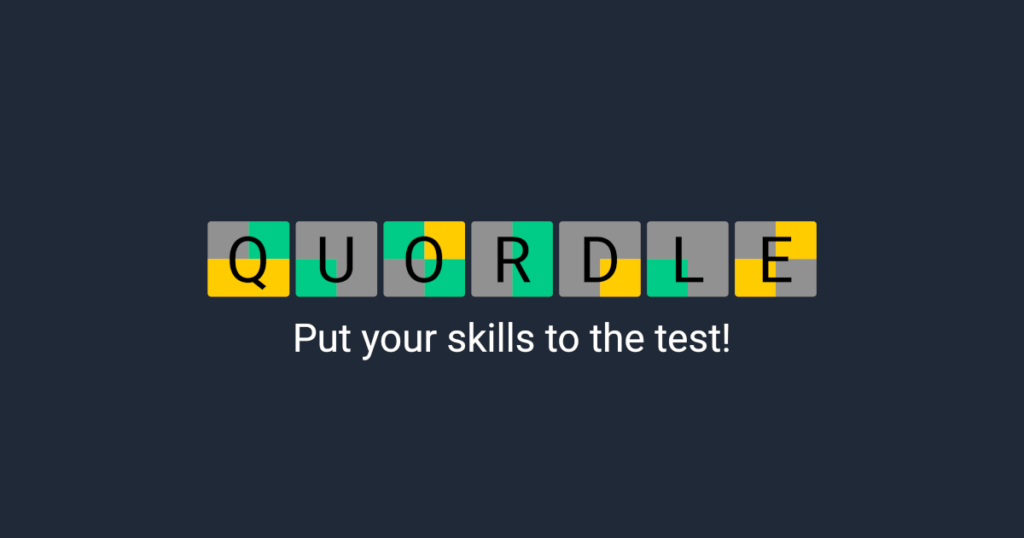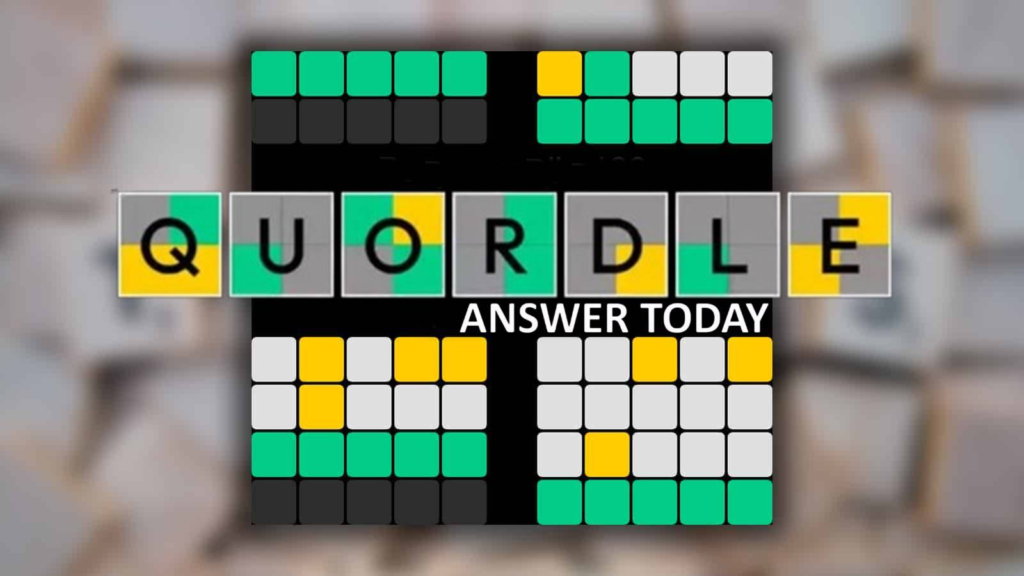In the landscape of online word puzzles, a new titan has emerged, reshaping the daily rituals of language enthusiasts and casual players alike. Quordle, a game that takes the foundational mechanics of the now-iconic Wordle and amplifies the challenge by a factor of four, has captivated minds and sparked competition in the digital realm. This article delves deep into the world of Quordle, exploring its origins, mechanics, strategies, and the unique position it holds in the pantheon of word games.

The Genesis of Quordle
The inception of Quordle can be traced back to the viral success of Wordle, a game that turned into a global phenomenon almost overnight. Wordle’s simple premise—guess a five-letter word in six tries or fewer—became a part of millions of daily routines. However, as its popularity soared, so did the appetite for more significant challenges. Enter Quordle: the brainchild of a group of developers who envisioned a game that retained the essence of Wordle but introduced a higher level of complexity and reward. In Quordle, players are not tasked with unraveling one but four words simultaneously, each in a separate grid, with the same guesses. This twist quadruples the challenge and the satisfaction of solving the puzzle.
Navigating the Complexity of Quordle
The mechanics of Quordle are straightforward yet deceptively complex. Players are given nine attempts to guess four five-letter words. Each guess applies to all four words simultaneously, with the game providing feedback for each letter in each word through a color-coded system: green for a correct letter in the proper position, yellow for a proper letter in the wrong position, and gray for a letter not present in any of the words. This multi-layered feedback mechanism demands a strategic approach, forcing players to think on multiple levels and consider how each guess can provide clues across four puzzles.
Strategic Play in Quordle
Successful Quordle players often employ strategies that maximize the information gained from each guess. A popular technique is the use of “opening words”—words chosen as first guesses that contain a mix of commonly used vowels and consonants, such as “audio” or “slate.” These opening moves are designed to quickly narrow down the pool of potential letters, making subsequent guesses more informed. Another strategy involves clearing one or two words first rather than attempting to solve all four simultaneously. This method allows players to reduce the number of variables and concentrate their guesses more effectively.

The Psychological Appeal of Quordle
Quordle’s appeal extends beyond its challenging gameplay. It taps into the human love for puzzles, the joy of discovery, and the thrill of competition, whether against oneself, the clock, or friends. The game’s difficulty makes success feel like a genuine achievement, stimulating the brain’s reward centers. Moreover, its daily limit—like Wordle, only one puzzle is available each day—ensures that it remains a habit rather than a compulsion, a refreshing start or interlude to the day rather than an endless time sink.
Quordle in the Digital Ecosystem
The rise of Quordle is indicative of a broader trend in the digital age: the resurgence of simple, intellectually stimulating games that contrast with the high-octane action of modern video games. Quordle and its ilk appeal to a wide demographic, from young students looking to sharpen their vocabulary and cognitive skills to older adults seeking a daily mental workout. Furthermore, Quordle’s social aspect—sharing scores on social media, challenging friends, and the sense of community around daily puzzles—adds a layer of connectivity and competition to the experience.
Educational Benefits and Cognitive Development
Quordle’s impact extends into educational realms, serving as a learning and cognitive enhancement tool. The game’s requirement for players to juggle multiple words simultaneously promotes improved vocabulary, spelling, and pattern recognition. Additionally, the strategic thinking and problem-solving involved in gameplay can enhance cognitive flexibility, critical thinking skills, and even emotional regulation as players learn to manage frustration and persevere through challenging puzzles.
The Future of Quordle and Word Games
As Quordle grows in popularity, its future seems as dynamic as its gameplay. The potential for variations and spin-offs is vast, with possibilities ranging from different languages to themed puzzles and beyond. The core appeal of Quordle—its simplicity, intellectual challenge, and the joy of solving—suggests that it, and games like it, will remain a staple in the digital puzzle landscape. Moreover, the community and competitive spirit that games like Quordle foster will likely drive their evolution, with player feedback and engagement shaping future iterations and innovations.

Conclusion
Quordle represents the next step in the evolution of word puzzles, offering a more challenging and engaging experience than its predecessors. Its success lies in its complexity and its ability to unite people of all ages and backgrounds to pursue daily intellectual achievement. As we look to the future, the potential for Quordle and similar games to influence education, cognitive development, and digital culture is immense. In a world where screens often dominate our attention for less productive reasons, Quordle stands out as a beacon of intellectual stimulation and community connection. One thing is clear as it continues to unfold and expand: Quordle has unleashed a new era in the world of word puzzles, and the challenge has only just begun.


